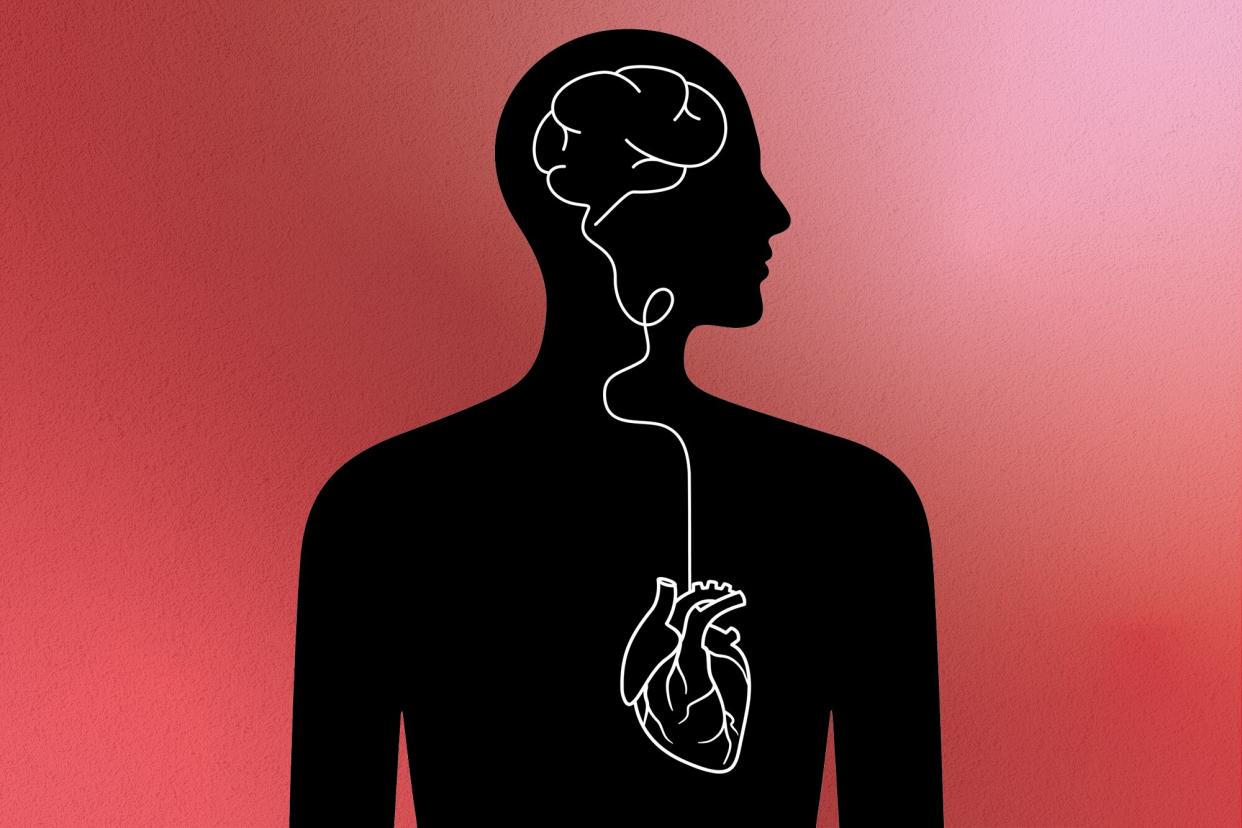Worse Heart Health at Age 36 Could Lead to Premature Brain Aging Later in Life, A New Study Suggests

Getty Images
Three of the 10 most common causes of death in the U.S. tie back to two very important organs—the heart and the brain—according to the Centers for Disease Control and Prevention. The top cause, heart disease, is joined by No. 5, stroke, and No. 7, Alzheimer's disease, on the sobering list.
This fact alone, not to mention how many Americans are living with some form of heart-health or dementia risk factor, certainly underscores that these two very important organs play a major role in our overall well-being and longevity. New research adds to the growing pool of evidence that heart health and brain health are directly connected. According to a study published in August 2022 in the journal The Lancet Healthy Longevity, poorer heart health at age 36 predicted a higher brain age later in life.
Read on to learn more about the findings, plus a handful of lifestyle strategies you can implement at any age to take care of your heart and brain all at once.
Related: 9 Things Experts Do Every Day for Better Brain Health
What This Health Study Found
To land at this conclusion, researchers at the University College London examined data from 456 participants in the Insight 46 Study, a database of medical information gathered as part of the Medical Research Council National Survey of Health and Development in the U.K. The individuals took part in the study throughout their lives, so the scientists could pull biometric and test data from different ages.
For this particular study, UCL researchers looked at MRI data and cardiovascular health reports of individuals who were between age 69 and 72 at the time of research. Using a computer modeling process to estimate brain age based on blood flow, nerve cell damage and blood vessels in the brain, they noticed that high blood pressure at age 36 predicted worse brain health and more rapid brain aging later in life. Although their biological ages only spanned 3 years, the estimated brain ages ranged from 46 to 93!
"We found that despite people in this study all being of very similar real ages, there was a very wide variation in how old the computer model predicted their brains to be. We hope this technique could one day be a useful tool for identifying people at risk of accelerated aging, so that they may be offered early, targeted prevention strategies to improve their brain health," Jonathan Schott, M.D., lead author of the study and professor of neurology at the UCL Dementia Research Centre in London tells University College London News.
Looking back at earlier medical reports, the scientists noticed that those who had high blood pressure at age 36 tended to have worse brain health—or an older "brain age"—later in life. They didn't explain why they selected 36 as the time to peek at heart health, but the moral of the story remains the same: a less-healthy heart in midlife may lead to a brain that ages quicker than expected.
So what does a higher brain age mean, exactly? It's associated with lower scores on cognitive tests, the study authors confirm, and predicted more brain shrinkage in the following two years. Both of these could be signals of pending or future cognitive decline.
Related: 5 Healthy Habits That May Slow Aging, According to Science
7 Ways to Boost Heart Health and Brain Health
The American Heart Association developed Life's Simple 7 to help explain the most common risk factors for heart disease. Translated a different way, these can act as action items for how to support heart health … and beyond. Those who follow these Simple 7 are not only at lower risk for heart disease, but are also less likely to develop dementia, according to an August 2018 study in the Journal of the American Medical Association. (No wonder the 13 risk factors for Alzheimer's disease include all of the Simple 7!)
Consider this your brain- and heart-health checklist:
Manage blood pressure; anything 120/80 mm Hg or below is the goal.
Control cholesterol so that total cholesterol falls under 200 mg/dL.
Maintain a healthy blood sugar level of less than 100 mg/dL (after fasting 8 hours) or less than 140 mg/dL (2 hours after eating).
Move your body—aim to accumulate 150 minutes or more of moderate physical activity or 75 minutes or more of vigorous activity each week.
Stop smoking, if you currently do.
Eat a balanced diet rich in fruits, veggies, whole grains, nuts, beans, legumes, lean animal proteins, fish and seafood.
Maintain a "healthy" weight; while this will vary per person and the BMI is not an accurate measure of well-being, the AHA recommends aiming for a weight that falls within the "healthy" range for your height.
Bonus tip: This year, the AHA added an additional detail—score enough sleep—to round out their list to what is now "Life's Essential 8." Discover the ideal amount of sleep for brain health, and the best time to go to bed for your heart health.
The Bottom Line
This new study found that midlife heart health is correlated with later-in-life brain health and cognition. So for a one-two punch of wellness wins, focus on the lifestyle tips above to show your brain and heart some TLC no matter what your age.
Up Next: The 10 Best Anti-Inflammatory Foods for Heart Health

